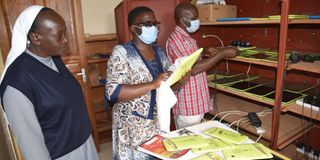Address gaps created by TSC guidelines

Teachers of St.Mary's Mukumu Girls Primary School in Kakamega preparing for reopening.
What you need to know:
- According to the guidelines, it will take a teacher who was in JG ‘M’ then more than 15 years to rise to the position of a principal.
- Similarly, no teacher has been appointed to serve in the D2 category, yet many teachers qualify.
Monday was World Teachers’ Day, the anniversary of the adoption of the 1966 ILO/Unesco recommendation concerning the status of teachers globally.
This recommendation sets benchmarks regarding the rights and responsibilities of teachers and standards for their initial preparation and further education, recruitment, employment and teaching and learning conditions.
This year’s theme, “Teachers: Leading in crisis, reimagining the future”, was correctly chosen, given the challenges that Covid-19 has caused in the teaching world.
The last bit of the theme, “reimagining the future”, is, however, a challenge that has been thrown into the Teachers Service Commission’s (TSC) court.
The “Career Progression Guidelines” CPG), introduced last year by the teachers’ employer, have created glaring gaps that must be addressed immediately. The many job groups created by the existing collective bargaining agreement (CBA) have become a source of discrimination that the commission must look into.
An example is that of teachers who were previously in Job Group ‘M’. There were those who were serving as principals, deputies or classroom teachers. When the CPG were effected, those who were serving as principals were moved to D3 and deputies D1. Unfortunately, the classroom teachers were taken to C5.
According to the guidelines, it will take a teacher who was in JG ‘M’ then more than 15 years to rise to the position of a principal. What discrimination!
Similarly, no teacher has been appointed to serve in the D2 category, yet many teachers qualify.
The other serious concern is on common-cadre promotions. After completing their probation, some teachers are still waiting to be moved to the next grade. Some, despite being appraised by their principals a year ago, are yet to get a response from the TSC.
The CPG also dealt a deadly blow to diploma teachers. They were barred from moving further than C3 (former JG ‘K’).
Most of these teachers have acquired degrees; some even are master’s holders. But TSC doesn’t recognise these qualifications.
On the issue of promotion, the guidelines have disappointed the process of appointing school administrators. Those who were not in administrative positions will have to wait longer as the ladder has been lengthened and the process made more tedious.
There is a need to collapse the many new job groups so that classroom teachers can also rise to administrative positions. Similarly, the CPG must not become a tool for discrimination.
In line with its vision statement of being a transformative teaching service for quality education, let TSC address these concerns.
Charles Ngeno, Kuppet executive secretary, Narok




